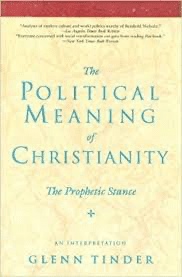The Political Meaning of Christianity: Revolution and … Equality/Inequality
Here I am taking up for comment and discussion (among those who have read it) pages 165 to 180 of The Political Meaning of Christianity by Glenn Tinder. The sections under consideration here are of Chapter Four: Social Transformation and they are titled Revolution and Inequality and Minority Rule.
First, however, a personal side note about the book. Because it is not especially easy to read, as many readers have noted here, I sometimes feel reading and commenting on it here is a burden. However, once I discipline myself to sit down with a red pen and read it, underlining key passages, I am glad I did! It is a challenging read, which is good for me (and I hope for you), and it inspires me—to think hard about the political meaning of Christianity.
In the section on Revolution, Tinder begins by arguing that true Christianity, as opposed to what I have here labeled “empirical Christianity,” is radical. “Christianity has a revolutionary flavor. This is owing primarily to the idea of the exalted individual.” (165) He also argues that modern revolutionary thought and action has roots in Christianity which is not, he says, a “pie-in-the-sky” escape from social transformation.
However, in the middle of the section Tinder segues into a critique of modern secular radicalism and its revolutions. According to him, modern revolutions have always led to despotism, something Christianity deplores. That is because of the secular ignorance of the doctrine and reality of sin. “The self-conception of modern revolutionaries is an uncompromising affirmation of the man-god.” (168)
At the end of the section Tinder recommends as compatible with Christianity and realistic “Western constitutional democracies.” (172) My question to him is haven’t these come about by means of revolutions, whether violent or not? I think they have. Most European countries achieved democracy on the backs of nineteenth century revolutions against absolute monarchy. And, of course, America achieved it by means of a violent revolution, something he ignores entirely.
Now, as an Anabaptist, I do not believe Christians are given any mandate or permission by God to carry out violent revolutions. I do think non-violent resistance is compatible with Christianity. (Here I follow the Mennonite social ethicist J. Lawrence Burkholder, 1917-2010 who advocated Anabaptist non-violent social action.) I also think that as Christians we can sympathize with and pray for and even defend revolutionaries with a just cause. Deadly violence is always a sin, but it is sometimes necessary.
I think there was quite a difference between the American War of Independence and the French Revolution. The former was not driven by vengeance and did not involve the merciless slaughter of innocent women and children, as did the latter. Some revolutions are justified even if Christians are called by Christ to be non-violent in our resistance to oppression.
The section entitled “Inequality and Minority Rule” is mostly a discussion of the regrettable inevitability of inequality among humans, something to be minimized as much as possible by Christians in the name of the exalted individual. But I am mostly interested in the final pages of the section where Tinder takes up the doctrine of predestination. He rejects double predestination as enfolding God in a “terrifying glory” and strongly hints that he agrees with the Russian theologian and mystic Berdyaev and with Karl Barth that “we must be open to the possibility…that all in the end will be saved.” (179)
Next I will take up the sections entitled Private Property and Capitalism and Mass Society (pp. 180-195)
*Note: If you choose to comment, make sure you have read these pages. If not, then do not comment but you may ask a question. In either case, make sure your comment or question is relatively brief (no more than 100 words), on topic, addressed to me, civil and respectful (not hostile or argumentative), and devoid of pictures or links.*














